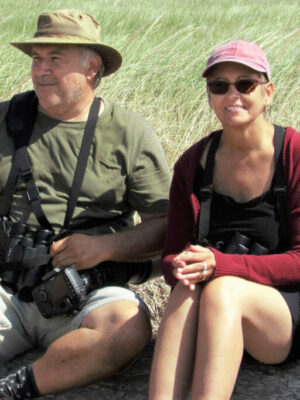About Us
Mitch and Irene are a happily married couple deeply connected to their Celtic roots and nature.
They maintain wildlife sanctuary sites in Dieppe and on Grand Manan.
Highly active members of nature clubs across the province, avid birders, and whale watchers, being outdoors is second nature.
Mitch’s happy place is on a boat observing pelagic birds, whales and other sea creatures.
He is a bird guide and nature photographer.
Irene is a member of the New Brunswick Botany Club.
She is a certified permaculture designer and creates eco art using recycled items.

On ethics and such
#Ethics #Blog #Blogbird
Orinophiles are bird lovers who enjoy keeping them or watching them in nature as a recreational activity.
The term birdwatcher was first introduced in 1901 by Edmund Selous and later in 1918 “bird” was used as a verb. For hunting it was written about as early as 1602. Shakespeare wrote about it in The Merry Wives of Windsor.
Birdwatchers (birders) make it a hobby where they enjoy the challenge of finding and studying birds in the field. They engage in activities that involve bird observation for pleasure.
Twitchers are only concerned with personal achievements. They can be inexperienced observers or photographers who often don’t follow birding etiquette. Often driven by competition, they are interested in adding to their list of rare birds they have seen or photographed. They will travel at the drop of a hat over great distances to spot a rare or migrant bird that has lost its course by a storm or to see a rare local bird and nesting birds…..
They disturb the bird by crowding it, by not keeping their distance, by advancing towards them with the intention of catching them in flight thus disrespecting the bird. The bird may not be in its natural habitat, it may be exhausted and unable to feed because it is being surrounded and harried at every turn by photographers and those who want to see it. They become stressed and may possibly die. Especially those most vulnerable to human disturbance. These poor birds are assailed by people sporting high-powered cameras and telescopes; like a horde of press photographers fighting for a better view. Some return to the site again and again to acquire the best possible photograph.
Birders are one with nature. They do not like being called twitchers or bird watchers because they also use their hearing during outings. They can recognize most calls and birdsong and document these findings. They take careful notes and have the greatest respect for them by taking care not to disturb them by following strict bird-watching etiquette especially when birds are nesting. They observe behavior, feeding habits, flight patterns and all other things in the environment including the habitat and weather.
Their carefully written field notes are shared for bird studies.
Serious birders are often members of nature clubs where they learn about becoming citizen scientists and formally document their observations. They have group outings and workshops that are educational and respectful of all things nature. They invest their time and money towards helping nature in their communities.
Ebird is an application (App) for the global birding community for mobile devices and a website. Those who are passionate about birds use this powerful data-driven resource that aids in the research, conservation, and education of birds around the world. It documents bird distribution, abundance, habitat use, and trends through checklist data collected by us. This application helps locate birds, keeps track of bird sightings through personal lists (photos, sounds, location), and helps plan trips to see ones that were sighted often in areas(hot spots).
It enables you to discover birds via email alerts.
It is a useful tool for managing lists by providing many ways to explore and summarize personal data by helping the Cornell Lab of Ornithology.